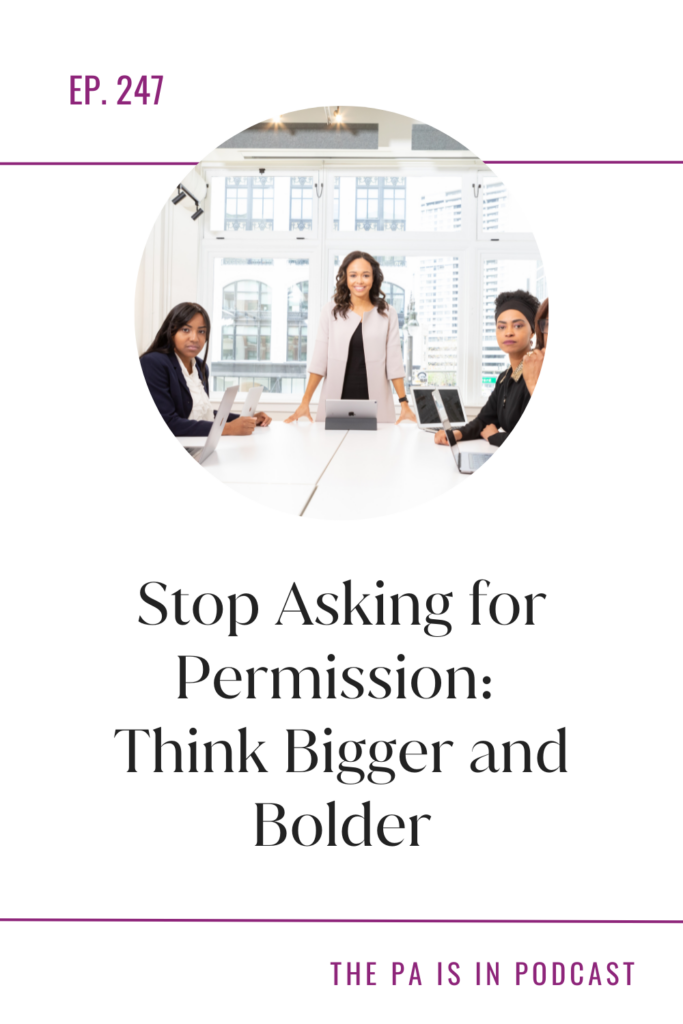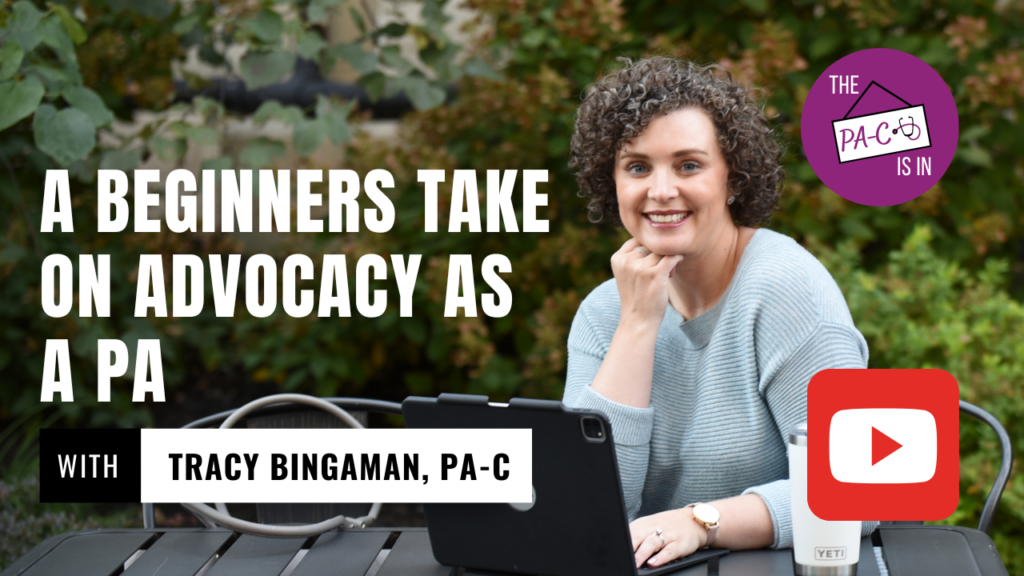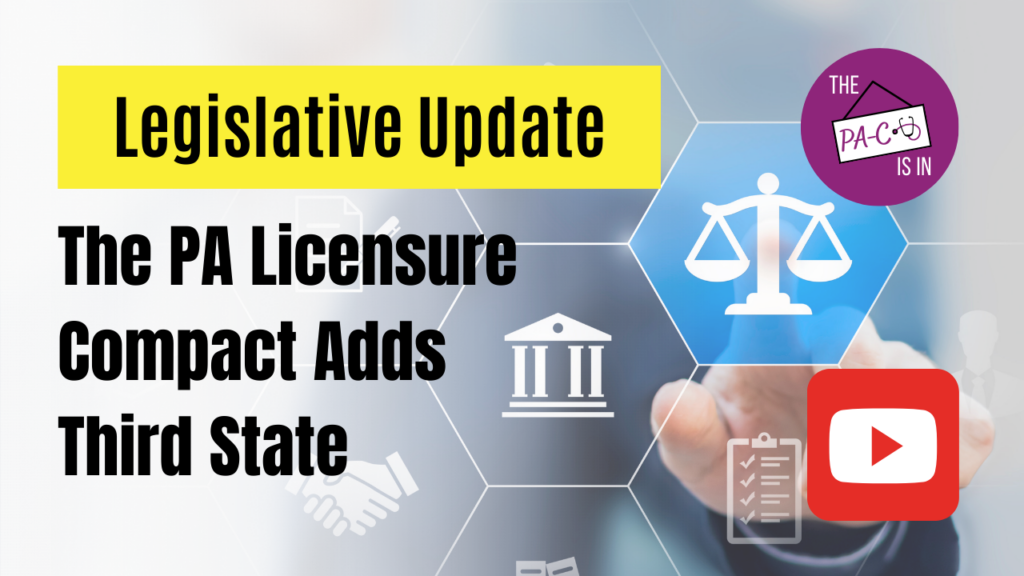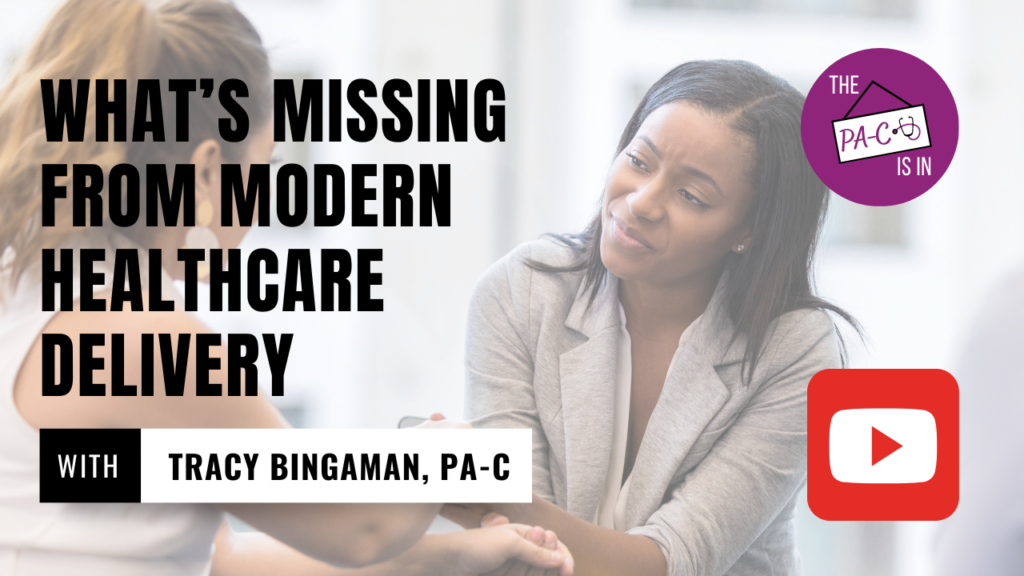
On today’s podcast, I have the honor of speaking with former president of AAPA and current CMO and VP of Clinical Affairs of AAPA, Jennifer Orozco. We discuss advocacy, making an impact, and how to get a seat at the table.
Jenn stresses the importance of removing barriers to PA practice because healthcare can’t afford to keep these barriers. PAs are experts in their fields and need to share their knowledge, experience and expertise with policy makers and those in leadership making decisions. Every PA has a powerful voice, and Jenn outlines ways in which we can start taking action today.
We don’t need to ask for permission to share our ideas or opinions. We need to think bigger than just our own clinic and our own hospital system. We need to be bold in sharing our expertise so that we can make positive changes in healthcare.
Press play to hear inspiration and a call to action so that we can keep moving the PA profession and the American healthcare system forward in a positive direction.
Listen to the Podcast: Apple Podcasts | Spotify
Watch on YouTube

Jennifer M. Orozco, DMSc, PA-C, DFAAPA
Jenn is the Chief Medical Officer and Senior Vice President of Clinical Affairs at the American Academy of Physician Associates (AAPA). She also served as AAPA president from 2021 to 2023. There are 3 divisions of clinical affairs that Jenn oversees: national health priorities, health equity & diversity, equity, & inclusion (DEI) work, and strategic partnerships & business development. Jenn says she gets to do the work she loves on a large scale at a national level.
Jenn has been a PA for 20 years, mostly working in vascular surgery. She describes herself as a recovered director of APPs. Jenn was the director of about 400 PAs and APRNs at a large academic center in Chicago. She also served as an assistant professor and faculty member, helping to start a PA program in Chicago.
Becoming an Advocate
After being a PA for 7-8 years, Jenn started being told no. She was doing things within her scope of practice, but received pushback from her organization. She kept hearing, “PAs can’t do that” and “ That’s against policy.” She would ask to see the policy, but usually it couldn’t be produced.
Jenn was the first PA in vascular surgery at that hospital. She started educating the hospital and administration on the scope of practice of PAs, state laws, and what PAs can do in practice.
Jenn’s role changed from clinical to administrative and faculty as administration realized Jenn’s knowledge and her goal to drive change. Administration asked Jenn to do more and more in administrative roles. Jenn says this was exciting for her because she could drive change in ways bigger than herself.
Who Are You Fighting For?
Initially, Jenn was fighting for herself and what she could do as a PA. Over time, though, she became frustrated by the system and how inefficient and overburdensome it was. Patients were waiting for the care they needed. Jenn’s thought process shifted from herself to her patients. Jenn asked herself why she was pushing for APPs to be able to work the way they were educated and trained to work? Her answers: it’s for the patients. Patients were waiting for hours in the waiting room or couldn’t even get an appointment for months. And in the meantime, her patients were losing limbs or their lives.
Think Bigger and Bolder
Jenn says that two former chief nursing officers (CNOs) pushed her to think differently. They helped her recognize her skillset and also encouraged her to challenge the status quo. One CNO gave Jenn her first opportunity as a director. After she became a director, the other CNO took her to the next wave of thinking. This CNO pushed Jenn to start thinking about her larger impact, even outside of their medical center. Jenn learned to think bigger and bolder. We need to see the bigger picture that’s beyond our own clinic and our own patients.
Jenn says she still struggles with imposter syndrome at times and will sometimes question if she should really be sitting at this table. But then she reminds herself that yes, she is qualified to be here.
Learning the Importance of Wellness
The COVID-19 pandemic was a major shift for Jenn, as it was for most healthcare providers. In 2020, Jenn was still practicing clinically as a leader in her organization. The pandemic showed Jenn how important it is to have balance. During the height of the pandemic, Jenn lived in the hospital 7 days a week for 1.5 years, as every provider did.
Coming out of that, Jenn struggled with anxiety and depression. She learned to focus on the importance of wellness and taking care of herself. Previously, Jenn focused on caring for her patients when at work and her three kids when at home. But she learned she would be a better mother and a better colleague if she took care of herself, not just her patients and her kids.
Jenn started cycling. It became her outlet. Jenn rides for 30-60 minutes almost every day as her “ride therapy.” She is very intentional about finding time for cycling. When she’s not cycling, Jenn will also do silent meditation or yoga. This is Jenn’s time for herself, not for her fiance or her children or her work.
Find Your Own Joy
Each person needs to find their own “thing,” even if it’s just 10-15 minutes during the day. Then you need to tell people about your thing and how important it is for you. People will understand and respect that you need this time. We are complex people who have multiple facets to who we are. We need to take time and pause for just 10 minutes – turn everything off and sit quietly at your desk.
We play many roles – woman, mom, wife, significant other, PA, friend, etc. Women put a tremendous burden on themselves and on each other. We need to let some of it go. We can’t be perfect people. We need to lift each other up. You don’t have to do what the person next to you is doing. Live in your current moment and find what brings you joy every day. Find it and hang onto it.
Learning to Let Go
The idea of something like becoming the CEO or CMO can be sexy, but then you need to think through the logistics of it. How would your life change? How would those changes make you feel? If logistically it wouldn’t work for you, then someone else can take on that leadership role or opportunity. It doesn’t have to be you. It’s ok to let that go.
Many clinicians eventually hate healthcare and their careers. They put in time, money, energy, and effort into years of a career and then realize they hate it and that it isn’t for them. That’s ok. Go ahead and pick something different. You can explore other options and change the path of your life. Go find your joy. Live the life you want to live and prioritize your mental health. No job or profession is worth the cost of your health, sanity, and wellness as a person.
We stay with things because we think we have to. You can make changes in your life. Don’t be afraid to lean on people and be vulnerable. It takes effort and courage to admit that you’re not perfect and that you can’t do it all by yourself. It takes more courage to then ask for help. But it will make all the difference.
Stop Asking for Permission
PAs need to start thinking bigger. Not just the lead APP, but the director of APPs. Not just the director, but the CMO. As PAs, we have the tools and experiences to solve so many problems in healthcare. Is it a new position, writing, blogging, research, a new clinical role? You don’t have to do any of these big roles, but you can do them. You should be aware of them and what’s out there. Don’t wait for someone to give you permission – just do it. Go ahead and take on the role.
Every single person can have an impact. You don’t need to be the CEO or CMO. But you do need to be aware of what’s going on in healthcare, and not just your clinic or medical center, but in your community, state, and beyond. You have a powerful voice as a PA. You have the knowledge and patient-facing experience to bring back to the decision makers. How can leaders make decisions and new policies without speaking to people on the frontlines working at the bedside? Frontline PAs need to start talking to policy makers and those in leadership. Stop asking for permission to talk to them. Talk about what is good for patients. Be the voice for patients, your community, and PAs in general. PAs are the experts – you need to share your expertise with policy makers. PAs should share their thoughts on clinical work, research, advocacy, patient care, inefficiencies, etc.
You Can Make an Impact
You have the ability to make change and make an impact – at home, in your healthcare system, and on an even larger scale. But in order to make an impact, you need to be involved. We need to talk to other PAs and get involved in what’s happening in our communities and states. Too few PAs do this. The same goes for education, preceptorship, and mentorship. New grads also need to be involved. As more experienced PAs, we need to help mentor new PAs.
Speak up and get involved before you feel ready. You only need an idea or an opinion. You don’t need a special certification, title, or prepared presentation. The act of showing up itself shows that you care and lets others get to know you. It demonstrates to those making decisions that you want to be involved. Showing up to meetings and sharing your voice builds relationships. These relationships are so important to drive change. Ask leaders in your organization to coffee so that you can start building relationships and sharing your ideas. You will fail sometimes. But you won’t succeed without failing.
Getting a Seat at the Table
If you’re wondering how to get more involved, start by asking about what committees are available to join. Talk to your direct manager, other PAs, nurses, administrators, or whomever you work with. Ask if certain meetings exist. Ask if you can be invited to the next meeting.
Remember that nobody wants their first encounter to be “solve my problem.” Instead, start by saying, “Let’s get to know each other more.” Share your story and ask theirs. Start building a relationship with your administrators and leaders. Ask them if they can share more about a policy or ask who’s in charge of quality improvement?
Jenn’s Personal Challenge to You
Write an email to your CMO or CEO and introduce yourself. Tell them, “I appreciate you and what you’re doing. I’d love to get a cup of coffee together and better understand the organization’s priorities this year.” Or you can just say, “Hi. I’m letting you know I’m here. Here’s a little about me and what I do.”
Don’t always send your complaints. It’s important to send notes of thanks and appreciation. That goes a long way and helps to build relationships. Later when you do need something or have a problem, you’re more likely to get it addressed quickly and completely. Jenn advises to create connections, don’t just have transactions.
The Future of PAs
PAs are growing as a profession. AAPA is growing as an academy. How do we grow and highlight and showcase PAs as experts? Not only in health and hospital systems, but in individual communities solving some of the biggest healthcare issues out there. Jenn wants to partner with people and systems to drive access, innovation, health equity, and community.
Healthcare needs to remove any barriers to PAs. It can’t afford to operate in the way it currently is with these barriers. There are currently 100 million people without access to healthcare and 150 million people without access to mental healthcare. In the next 20 years, there will be 80 million people over the age of 65 – how will we care for them? PAs are a huge part of the answer. We need to be involved and use our voices because we’re experts.
Connect with Jenn
- Email: jorozco@aapa.org
- Website: www.aapa.org
Connect with Tracy
Other Posts and Videos You’ll Love
Episode 158: The Future of the PA Profession?: Listen to the podcast | Watch on YouTube | Read the blog post

Episode 201: A Beginner’s Take on Advocacy as a PA: Listen to the podcast | Watch on YouTube

Bonus Episode: PA Licensure Compact Adds Third State: Listen to the podcast | Watch on YouTube

Episode 216: What’s Missing from Modern Healthcare Delivery: Listen to the podcast | Watch on YouTube

Episode 210: You Are More than a PA; You Are a Person: Listen to the Podcast | Watch on YouTube | Read the blog

Episode 225: Your Wok-Life Balance and Negotiation Questions Answered: Listen to the podcast | Watch on YouTube

Episode 207: Are You Thriving or Surviving as a Healthcare Worker?: Listen to the podcast | Watch on YouTube
